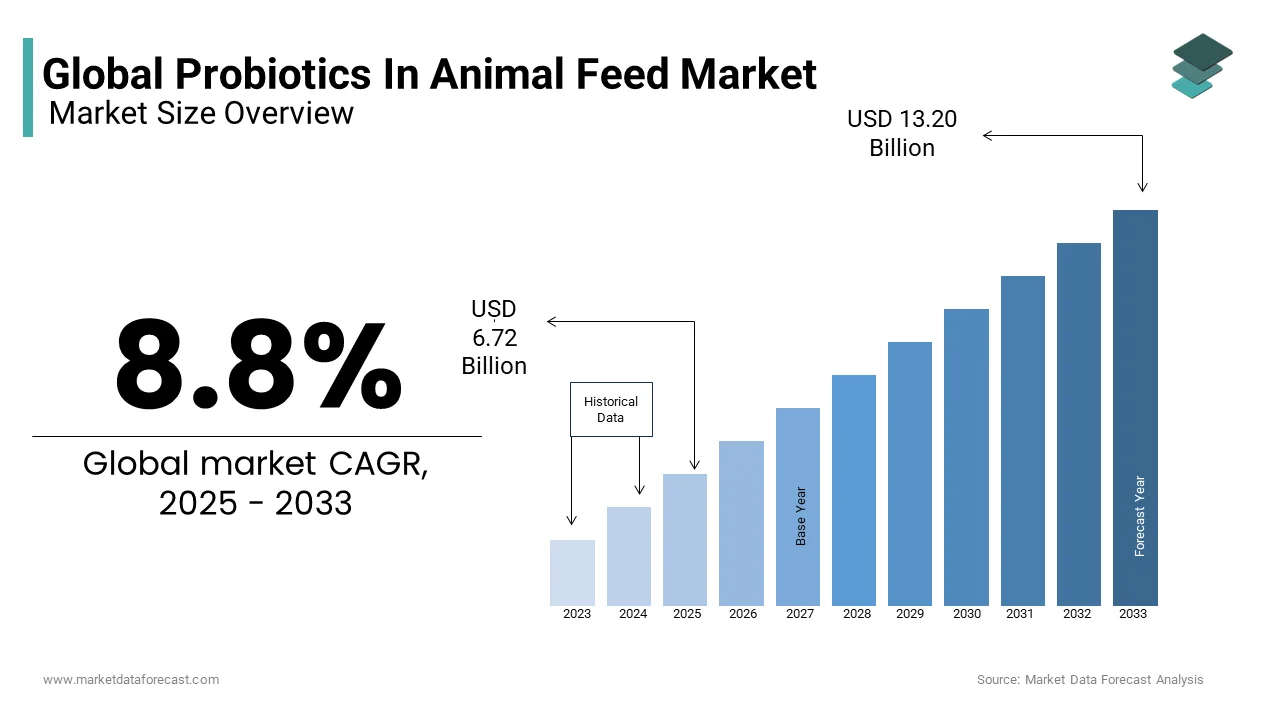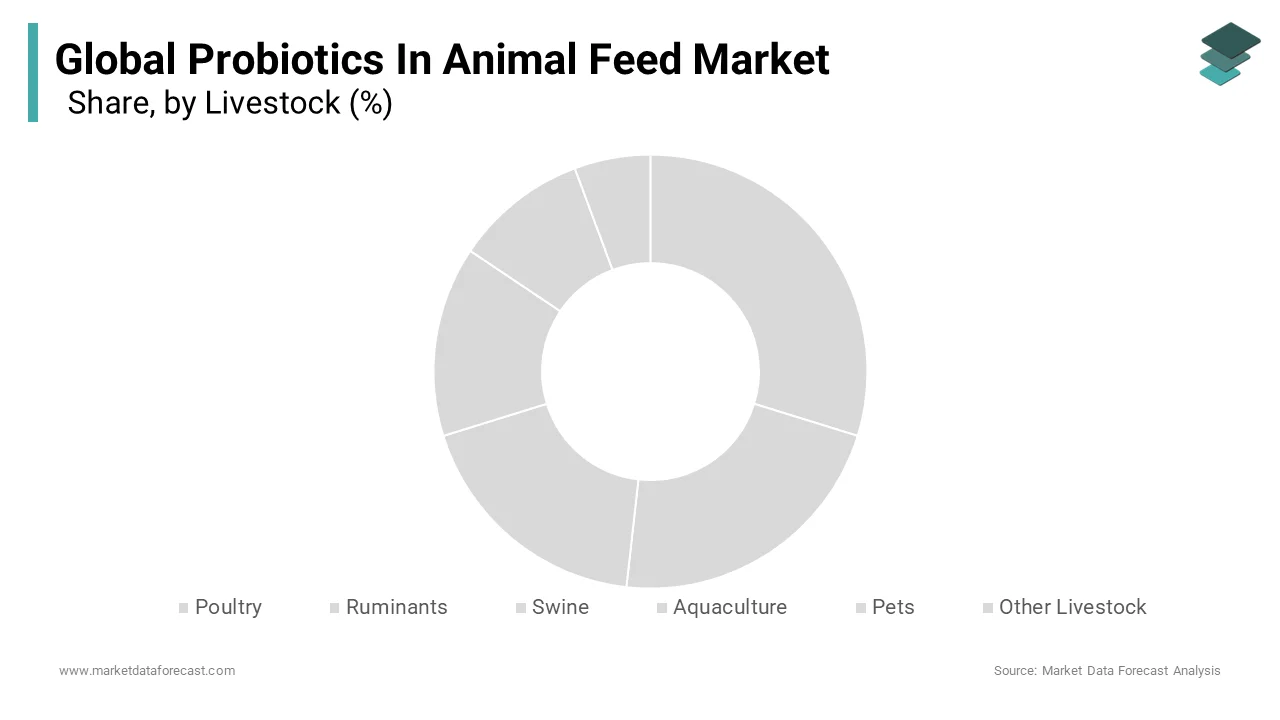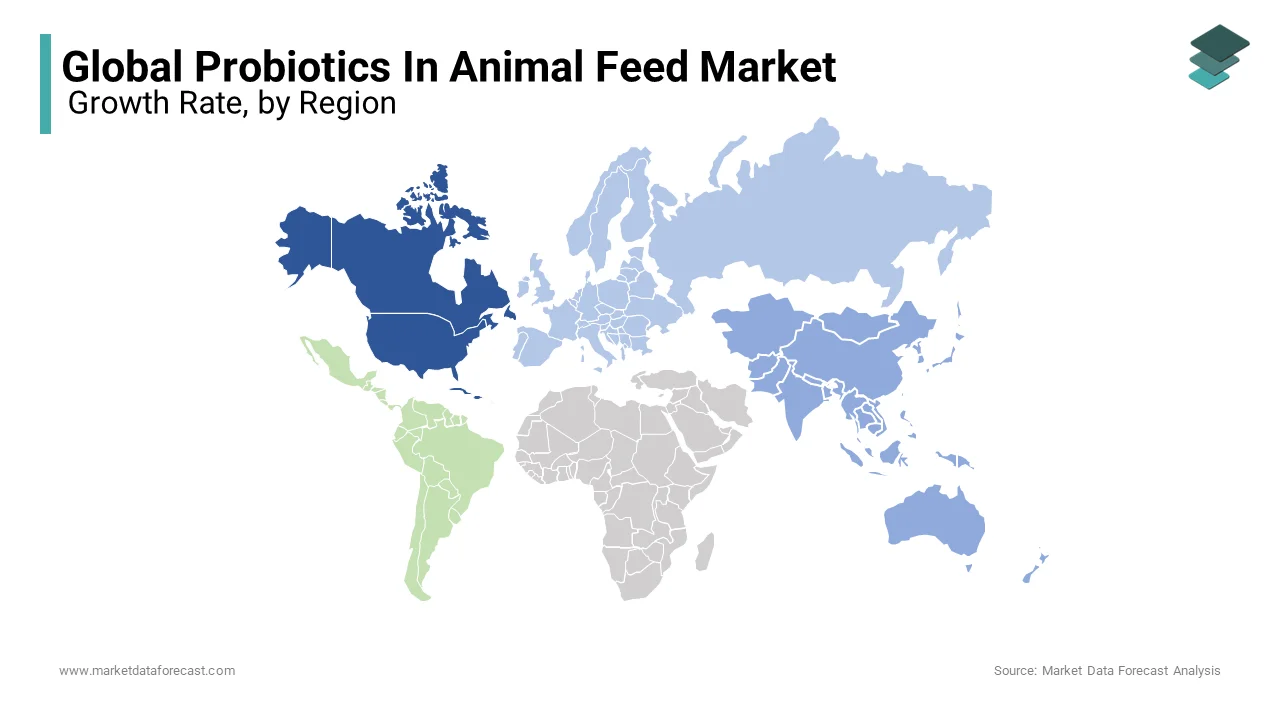Global Probiotics In Animal Feed Market Size, Share, Trends & Growth Forecast Report, Segmented By Bacteria (Streptococcus Thermophiles, Bifidobacteria, and Lactobacilli), Livestock (Cattle, Poultry, Swine, And Aquaculture), Function (Yield, Immunity, And Productivity), Form (Dry And Liquid), And By Region (North America, Europe, Asia Pacific, Latin America, Middle East And Africa), Industry Analysis From 2025 to 2033
Global Probiotics in Animal Feed Market Size
The global probiotics in animal feed market was valued at USD 6.18 billion in 2024 and is anticipated to reach USD 6.72 billion in 2025, from USD 13.20 billion by 2033, growing at a CAGR of 8.8% during the forecast period from 2025 to 2033.

Probiotics are living microorganisms that provide health benefits when consumed or taken into the body. They are used in animal feed and are generally produced commercially and available in the market in liquid and dry form. The probiotics are considered to the growth and health stimulators and are used significantly in animal feeding, particularly in swine and poultry production.
The probiotics are classified into bacteria, yeast, and fungi. The most widely used bacteria include Lactobacillus, Bacillus, Streptococcus, Pediococcus, Enterococcus, Bifidobacterium, and Propionibacterium. It improves the digestion and availability of essential nutrients that help the animals maintain and defend themselves against infectious agents, enhances the health and development of the animal, and produces more milk, eggs, and meat. Probiotics are good bacteria and yeast that fight off pathogenic bacteria, improve the immune system, and restore the gut microbial balance. Nowadays, farmers are giving probiotic feed supplements to poultry, ruminants, fish, swine, and other livestock. The increasing demand for protein-based animal products is fueling the growth of the animal feed probiotics market during the forecast period between 2022 and 2027.
MARKET DRIVERS
The driving force of probiotics in the animal feed market is the increasing demand for protein-rich feed. The population around the globe is becoming more health-conscious and is likely to consume protein-rich food, particularly animal-based protein food such as dairy products, eggs, meat, and meat products. To meet the increasing demand, the farmers are giving probiotics to the animals to keep them safe and prevent them from harmful pathogens and diseases.
Furthermore, the increasing awareness among livestock farmers in developing countries is another factor that fuels the growth of the market. Farmers are becoming aware of the benefits of probiotics as they help in the growth and development of animals, increase directivity, improve the immune system, and increase farm profitability. Therefore, farmers are adding probiotics to animal feed, which fuels the growth of the market.
Moreover, the stringent rule of the European Union also propels the growth of the market. The European Union has banned the use of antibiotics in animal feed, which drives the demand for probiotics in the market, as probiotics are much more beneficial as compared to antibiotics.
All the above factors are responsible for the growth of probiotics in the animal feed market during the projected period between 2022 and 2027.
MARKET RESTRAINTS
The high research and development cost for innovation of new probiotics and the stringent regulation for probiotics manufacturers by international bodies such as the US Food and Drug Administration (FDA), WHO, European Food Safety Authority, Australian Pesticides, and Veterinary Medicines Authority, etc. are the key factors that hinder the growth of the probiotics in animal feed market growth.
REPORT COVERAGE
|
REPORT METRIC |
DETAILS |
|
Market Size Available |
2024 to 2033 |
|
Base Year |
2024 |
|
Forecast Period |
2025 to 2033 |
|
CAGR |
8.8% |
|
Segments Covered |
By Source, Livestock, Form, Region |
|
Various Analyses Covered |
Global, Regional, & Country Level Analysis; Segment-Level Analysis, DROC, PESTLE Analysis, Porter’s Five Forces Analysis, Competitive Landscape, Analyst Overview of Investment Opportunities |
|
Regions Covered |
North America, Europe, APAC, Latin America, Middle East & Africa |
|
Market Leaders Profiled |
Koninklijke DSM N.V. (Netherlands), Du Chr. Hansen (Denmark), DuPont (US), Evonik Industries (Germany), Land O'Lakes (US), Mitsui & Co., Ltd. (Japan), Ohly (Denmark), Lesaffre (France), Alltech (US) |
SEGMENTAL ANALYSIS
By Livestock Type Insights
The Poultry segment is estimated to dominate the market during the projected period due to the favorable demand and equally rapid production scenario. Additionally, the poultry flock is highly exposed to pathogens like Salmonella enterica, Escherichia coli, and Campylobacter jejuni because of improper hygiene and sanitation management of poultry livestock.

By Source Insights
The bacteria segment is again bifurcated into Lactobacilli, Streptococcus thermophilBifidobacteriaacterium, and the yeast & fungi segment is also bifurcated into Saccharomyces cerevisiae, Saccharomyces boulardii, and other sources. Bacterial sources such as Lactobacillus and Bifidobacterium are presently dominating the market as these are widely used in the majority of animal feed sold worldwide. Additionally, bacterial strains have proved to be viable and feasible alternatives to the antibiotic growth promoter. However, the yeast & Fungi segment is expected to dominate the market during the forecast period due to the rising use of yeast in fungi in animal feed, particularly in ruminant feed.
By Form Insights
Based on Form, the global probiotics in animal feed market is segmented into Dry, Liquid. The dry form of probiotics in animal feed is going to dominate the market ovforeseeableoresee. Period, the reason for this growth is that the dry form is easier to handle & and improves shelf life and has low-moisture content as compthe ared to the liquid form.
REGIONAL ANALYSIS
North America accounted for the largest market share of global probiotics in the animal feed market. The growing awareness about the benefits of probiotics for animal health is creating a big opportunity for animal feed probiotics manufacturers. In this region, the United States animal feed probiotics market is expected to register a CAGR of 4.7% during the projected period. The reason behind this growth is the increasing industrialization of livestock production, as well as the rising demand for probiotics in animal feed for companion animals and cattle and the increasing demand for animal-based protein products are some of the factors that drive the demand of probiotics in animal feed that further boosts the growth of the market. Furthermore, the United States has well-established industries that have a strong demand for organic meat, which encourages farmers to improve product quality, favorably boosting the growth of the animal feed probiotics market in the coming years.

Asia-Pacific is expected to witness a significant growth rate during the forecast period. The demand and consumption of probiotics in animal feed are increasing in this region. The rising awareness among livestock farmers about the benefits of probiotics in animal health is fueling the demand for animal feed probiotics. The demand for meat, animal-based protein products, and dairy products is increasing, which drives farmers to improve the quality and quantity of the meat, which in turn boosts probiotics in the animal's output. The production of poultry meat is also high in countries such as China and India, propelling the market growth of probiotics in animal feed.
Europe is also showing a steady growth rate over the project,d period as the European Union has banned the use of antibiotics in animal feed; therefore, there are significant growth opportunities for this market as probiotics enhance digestion as well as prevent various types of diseases.
KEY MARKET PLAYERS
Koninklijke DSM N.V. (Netherlands), Du Chr. Hansen (Denmark), DuPont (US), Evonik Industries (Germany), Land O'Lakes (US), Mitsui & Co., Ltd. (Japan), Ohly (Denmark), Lesaffre (France), Alltech (US). Some of the market players dominate the global probiotics in animal feed market.
RECENT HAPPENINGS IN THE MARKET
- In May 2021, Evonik developed a science-based system for the gut health of the broiler chicken, laying hens, and weaning to the growing-finishing pigs. The science-based new system solution includes low-protein diets, amino acids, probiotics, and services & consulting.
- On November 19, 2020, Evonik’s Animal Nutrition business line announced the launch of “Ecobiol Fizz,” which is the first probiotic for chicken in effervescent tablet form. The Econiol Fizz contains a microbial strain of the species Bacillus amyloliquefaciens. It is used to stabilize the intestinal microbiota of the broiler and chicken reared for laying, particularly at the time of stressful periods.
MARKET SEGMENTATION
This research report on the global probiotics in probiotics in the animal feed market is segmented and sub-segmented into Livestock type, Source, and Form.
By Livestock Type
- Poultry
- Ruminants
- Swine
- Aquaculture
- Pets
- Other Livestock
By Source
- Bacteria
- Lactobacilli
- Streptococcus thermophilus
- Bifidobacterium
- Yeast & Fungi
- Saccharomyces cerevisiae
- Saccharomyces boulardii
- Other sources
By Form
- Dry
- Liquid
By Region
- North America
- Europe
- Asia-Pacific
- Latin America
- Middle East & Africa
Frequently Asked Questions
What is the current size of the global probiotics in animal feed market?
The global probiotics in animal feed market is expected to be valued at USD 6.72 billion in 2025.
Which regions are leading in terms of market share for probiotics in animal feed?
North America and Europe currently hold the largest market share for probiotics in animal feed, driven by the presence of well-established animal husbandry industries and growing consumer demand for natural feed additives.
What are the key trends driving growth in the probiotics in animal feed market in Asia Pacific?
In Asia Pacific, the increasing focus on animal health and welfare, along with the growth of the livestock industry, is driving the demand for probiotics in animal feed.
How is the probiotics in animal feed market in North America responding to the demand for antibiotic alternatives?
In North America, probiotics in the animal feed market are witnessing increased adoption as an alternative to antibiotics in livestock production, driven by concerns about antimicrobial resistance and food safety.
What factors are hindering the growth of the probiotics in animal feed market in Asia Pacific?
In Asia Pacific, factors such as limited awareness about the benefits of probiotics, price sensitivity among farmers, and challenges in distribution and storage are hindering the growth of probiotics in the animal feed market.
Related Reports
Access the study in MULTIPLE FORMATS
Purchase options starting from $ 2500
Didn’t find what you’re looking for?
TALK TO OUR ANALYST TEAM
Need something within your budget?
NO WORRIES! WE GOT YOU COVERED!
Call us on: +1 888 702 9696 (U.S Toll Free)
Write to us: [email protected]